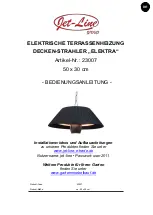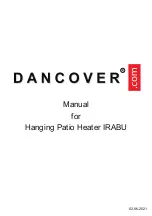
Hearthstone Quality Home Heating Products, Inc.
Bristol DX Model 8763
29
Removal of Log Set
CAUTION: THE LOG SET, BURNER, AND EMBERS
RETAIN HEAT AND CAN BE VERY HOT! ALLOW 2
TO 3 HOURS TO COOL AFTER PILOT LIGHT IS
TURNED OFF FOR SAFE HANDLING.
To remove the log set, follow the Installation of Log
Set instructions in the reverse order.
Completing the Installation
1. Close the firebox
– reverse the firebox
access procedure outlined on page
9
.
2. Install
any
batteries
as
necessary.
Synchronize the Remote Transmitter and
Receiver (see page 32).
Ceramic Burner Fissures
The ceramic burner may develop surface fissures at
or after the initial burn. These fissures are normal, and
have no effect on the operation, or safety of the stove.
However, if a crack is found that penetrates into the
fuel accumulation area below the ceramic surface;
discontinue operation until the stove is checked by a
qualified technician.
Air Shutter
The air shutter is used to regulate the air-to-gas
combustion mixture of each burner, which in turn
influences the size and color of the flames. The air
shutter is factory positioned in the general location
needed for testing the unit with natural gas (NG) and
minimum venting. However, if the unit is not burning
as well as it should in your installation, then the air
shutter may need adjusting.
To determine if an air shutter needs adjustment, it is
necessary to view the flame pattern with the burner
output set at its highest setting. Allow the unit to
operate for at least 10 minutes to allow the entire unit
to reach temperature, and for the flame pattern to
stabilize. Generally, the more air (open shutter) in the
mixture, the bluer the flame. Less air (closed shutter)
results in a more yellow flame, but too little air will
result in incomplete combustion, low efficiency and a
dirty burn. There are two simple guidelines to aid in
determining the correct flame pattern:
1. If the flame just above the surface of the
burner or at the base of the logs is completely
blue, the air shutter may be open too far;
2. If the flame is dirty, sooty, or licks the top of
the firebox, the air shutter may be closed too
far.
Refer to Figure 12 on page 17 for minimum required
settings. Some conditions cannot be corrected
through air shutter adjustment; an adjustment must
be made to the gas supply pressure or by changing
the restriction plate setting. Qualified
servic e
personnel must perform supply line/manifold gas line
pressure
adjustments
and
restrictor
plate
adjustments. Do not attempt to complete any part of
the installation or adjustment of this unit unless
technically qualified.
Air Shutter Adjustments
WARNING: THE ADJUSTING ROD IS HOT!
WARNING: THE AIR SHUTTER IS FACTORY SET
AND ONLY A QUALIFIED
GAS TECHNICIA N
SHOULD MAKE ADJUSTMENTS.
The air shutter is adjustable while the stove is
burning. Adjustments are easier to make with the
Valve Cover Panel removed. Refer to Figures 36 and
37 for location. Loosen the set screw of the Air
Shutter Lock using a Phillips screwdriver. Move the
shutter rod left or right to adjust the flame pattern
.
Push rod into the firebox to close the shutter, and pull
out to open. When the flame pattern is correct,
tighten the set screw without letting the rods move.
Figure 36
– Stove Bottom View: Air Shutter
Adjusting Rod
Note:
Very little movement is needed to substantially
change the burn and flame patterns. Some
conditions cannot be corrected through air shutter
adjustment; an adjustment must be made to the gas
supply pressure. Supply line/manifold gas line
pressure adjustments must be performed by
















































